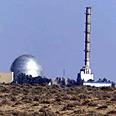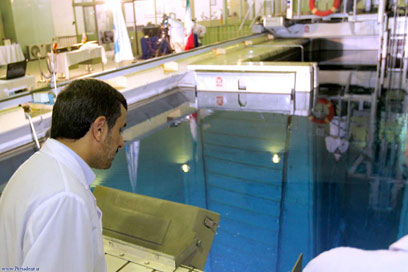
Iran criticizes US over delayed Mideast atomic talks
Iranian nuclear envoy Soltanieh says Washington has taken Helsinki conference 'hostage,' wants to 'support Israelis' nuclear weapon capability'
Iran criticized the United States on Monday for announcing that talks on banning atomic arms in the Middle East would not take place as planned this year, accusing it of causing a "serious setback" to the nuclear Non-Proliferation Treaty (NPT).
The US State Department said on Friday that the mid-December conference on creating a zone free of weapons of mass destruction would not occur and did not make clear when, or whether, it would take place.
Related articles:
- 'Iran must steer clear of US interests in Gulf'
- Bloggers: Self-produced Iranian UAV - a sham
- Ahmadinejad: Israel desire to attack Iran 'childish'
Iran, which is accused by the West of developing a nuclear weapons capability, said this month it would participate in the meeting that had been due to take place in Helsinki, Finland.
Asked about the US announcement, Iranian nuclear envoy Ali Asghar Soltanieh told state broadcaster Press TV from Vienna: "It is a serious setback to the NPT and this is a clear sign that the US is not committed to the obligation of a world free of nuclear weapons."
Video courtesy of jn1.tv
Even if the talks eventually occur, Western diplomats and experts expect little progress any time soon due to the deep-rooted animosities in the region, notably the Arab-Israeli conflict and Israeli concerns about Iran's nuclear program.
Washington feared the conference could be used as a forum to criticize its ally Israel - widely believed to be the volatile region's only nuclear-armed state - a concern only likely to have increased after eight days of fierce Israeli-Palestinian fighting that ended with a ceasefire last week.
Israel, which says say Tehran is the Middle East's main proliferation threat, had not said whether it would attend.
Iran and Arab states often say Israel's presumed nuclear arsenal poses a threat to Middle East peace and security.
The plan for a meeting to lay the groundwork for the possible creation of a Middle East free of weapons of mass destruction was agreed at a 2010 conference of 189 parties to the 1970 NPT, a treaty designed to prevent the spread of nuclear arms in the world.
Israel, which neither confirms nor denies having nuclear arms, is not a signatory.
US and Israeli officials have said a nuclear arms-free zone in the Middle East could not be a reality until there was broad Arab-Israeli peace and Iran curbed its nuclear program, which Tehran says is for peaceful energy and research purposes.
Soltanieh, Iran's ambassador to the UN nuclear agency, said: "The US has taken hostage this Helsinki conference for the sake of Israel ... they want to support the Israelis' nuclear weapon capability."
Some Western diplomats said they suspected that Tehran only agreed to attend the Helsinki talks once it had become clear they were likely to be postponed anyway.
The two other co-sponsors of the meeting together with the United States - Russia and Britain - signaled in separate statements at the weekend their hope for a delay to be as short as possible and that the talks could be held next year instead.
The US State Department said it would keep working to try to bring about a meeting, adding such a gathering must take into account the security of all the states in the region and operate on the basis of consensus.
- Follow Ynetnews on Facebook and Twitter
- Receive Ynetnews updates directly to your desktop











